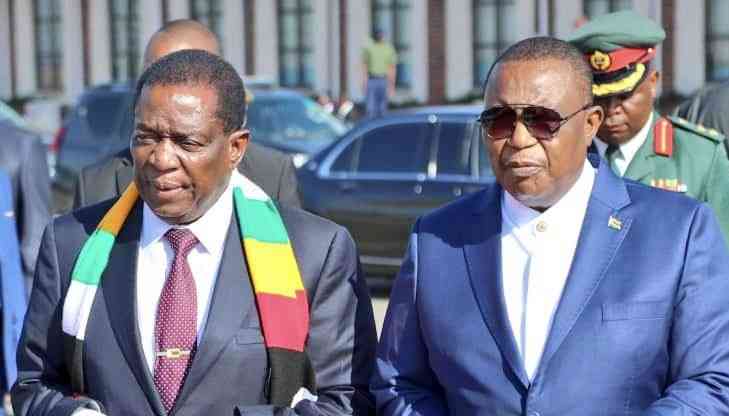
Many are beginning to blame the victims, the Togolese national team, for having driven into Cabinda instead of flying in but this is to pass the buck.
The Angolan government had declared Cabinda safe and scheduled some of the matches of the African Nations Cup to be played in the province. The Angolan government was remiss in its intelligence gathering and the buck stops there.
But where is Cabinda? Cabinda is an aberration of the partition of Africa. It’s not even in Angola, it is 60 km away, separated from Angola by a strip of Democratic Republic of the Congo (DRC) land.
It shares its borders with the DRC and Republic of Congo (Congo Brazzaville) and to the west it is bordered by the Atlantic Ocean.
The word “enclave” is often used to describe this “closedness” of Cabinda. So, Angola’s claim over Cabinda is much like South Africa claiming that Zimbabwe’s Midlands province belongs to it.
When Africa was parcelled out among the Europeans at the Berlin Conference in 1884 Cabinda became a Portuguese protectorate (or colony), so did Angola. On August 1 1975 Cabinda proclaimed its independence from Portugal.
- Chamisa under fire over US$120K donation
- Mavhunga puts DeMbare into Chibuku quarterfinals
- Pension funds bet on Cabora Bassa oilfields
- Councils defy govt fire tender directive
Keep Reading
In November that year Angola did the same and soon after, with the aid of Cuba, the ruling MPLA invaded Cabinda, overthrew the provisional government and incorporated it into Angola.
Cabinda had been fighting for a separate state since the early 1960s. In 1963 the different movements that had been fighting for secession amalgamated to form the Front for the Liberation of the Enclave of Cabinda (FLEC) which fought a low-intensity guerrilla war in the 1970s and 1980s, attacking Angolan government troops and economic targets or creating havoc by kidnapping foreign employees working in the province’s oil and construction businesses.
As recently as 2003 the United Nations Commission for Human Rights revealed many MPLA atrocities in Cabinda and a year later Human Rights Watch reported that the MPLA continued to commit crimes against civilians in Cabinda.
But why does Angola claim dominion over Cabinda? It must be about its wealth!
“Consisting largely of tropical forest Cabinda produces hardwoods, coffee, cocoa, crude rubber and palm oil. The product for which it is best known, however, is its oil.
Conservative estimates are that Cabinda accounts for close to 60% of Angola’s oil production, estimated at approximately 900 000 barrels a day, and it is estimated that oil exports from the province are worth the equivalent of US$100 000 per annum for every Cabindan.
Yet it remains one of the poorest provinces in Angola. An agreement in 1996 between the national and provincial governments stipulated that 10% of Cabinda’s taxes on oil revenues should be given back to the province, but Cabindans often feel that these revenues are not benefiting the population as a whole, largely because of corruption” say the online encyclopaedia Wikipedia.
Every country in the world — and that includes Zimbabwe — has its own sources of conflict or potential sources of conflict.
In Zimbabwe a potential source of conflict is the increasing perception that all the country’s wealth is benefiting only one region, Harare province, and, as a corollary, because Zimbabwe is ethnically diverse many may feel one ethnic group dominates.
Harare has been called Bambazonke (Grab All) since the days of the Central African Federation (1953-1963).
This was the period when most resources from the three countries making up the federation — Southern Rhodesia (Zimbabwe), Northern Rhodesia (Zambia) and Nyasaland (Malawi) — were channelled towards the development of Salisbury (Harare) which was the designated capital of both Southern Rhodesia and the federation. This caused much consternation up north and ultimately led to the break-up of the grouping.
Commentators are already beginning to write about the “Bambazonke mindset” referring to the channelling, real or perceived, of all the country’s resources towards Harare. Without being alarmist, the powers-that-be must begin to take these “whisperings” seriously.
Last week the inaugural sale of Chiadzwa diamonds flopped but people were already beginning to ask how the money raised from the auction was going to benefit the people of the region from which the diamonds had been mined.
True, a huge chunk of the proceeds from the diamonds were going into the fiscus from which hopefully they would be used to develop the country. But it goes without saying that Harare would benefit most, much to the chagrin of the people from the eastern region.
As Zimbabwe embarks on the process of writing a new constitution no doubt this issue will be raised again and again. Some have suggested devolution; and there are many passionate reasons for and against it.
I would be against devolution because its potential to spawn secessionist jingoism is huge, but there certainly should be a clause in the new charter that should spell out how a reasonable chunk of a region’s gross earnings should be channelled back to that region.
During the land redistribution exercise a lot of competent farmers from dry regions such as Manicaland, Masvingo, Matabeleland and the Midlands were denied land in the wet Mashonaland provinces.
Although this didn’t seem to be central government policy, these farmers were told openly that they should go back to their own provinces.
The people of Mashonaland felt that they should benefit most from the natural resource of fertile land. Why shouldn’t the people of Manicaland feel that they too should be entitled to benefit most from the diamonds being mined in their region?
Why shouldn’t the Midlands also feel the same about the Murowa diamonds? Or Matabeleland South, about the River Ranch diamonds? Same with all other resources.
Although the goings-on in Cabinda may seem an extreme example, there is no reason why Zimbabweans should not try to eliminate their potential sources of conflict, and the on-going constitution-making process affords the country this opportunity.
Nevanji Madanhire











